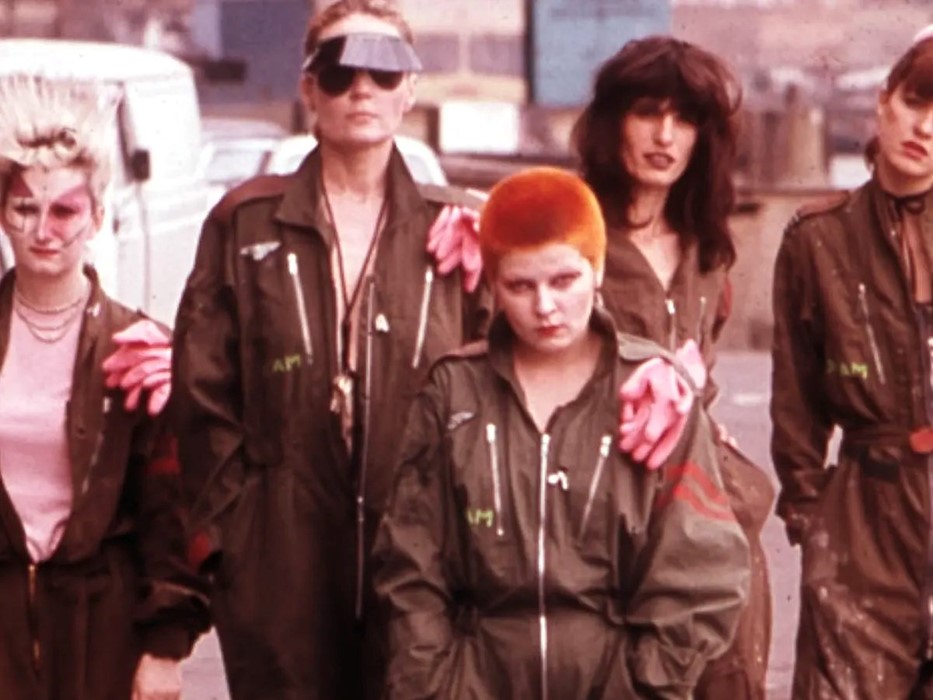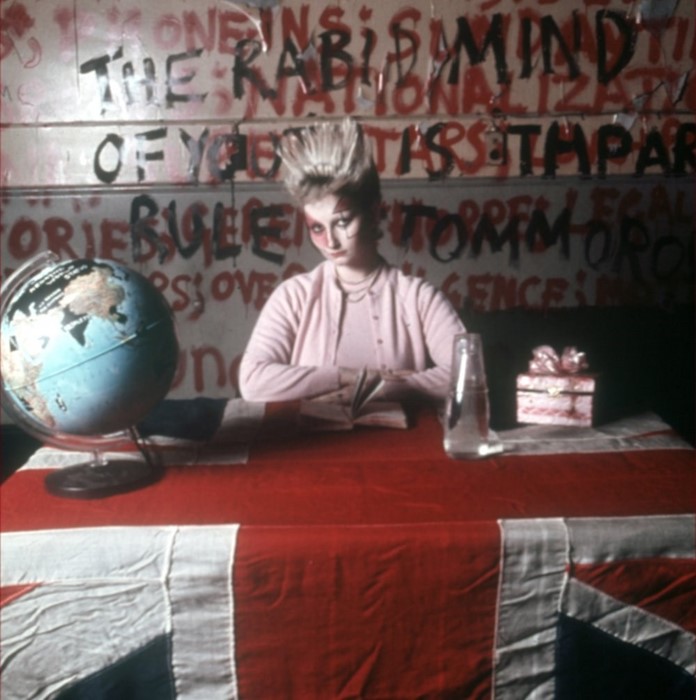As some people celebrate the Queen’s platinum jubilee, Alex Denney tracks the journey of Derek Jarman’s seminal film from notoriety to immortality
This article was originally published on Another Man:
“Punks were in the audience screaming ‘THIS AIN’T PUNK!’ and ‘WHAT A LOAD OF BOLLOCKS!’ and ‘SHIT!’” That’s how Jayne County recalled the raucous atmosphere at the premiere of Jubilee, Derek Jarman’s dark sci-fi reckoning with a dystopian England, in an interview from 2011.
County, a veteran of the New York punk scene who cameos in the film, was no more charitable in his own assessment of Jarman’s vision, released in cinemas 40 years ago this month. “Wasted celluloid”, she called it – though the scene she starred in wasn’t half bad, naturally.
Jarman’s time-travelling fantasy follows Queen Elizabeth I and her courtly sage, the occult philosopher John Dee, as they are plunged into a dark future by the spirit guide Ariel, a character lifted from Shakespeare’s The Tempest. There, they find gangs of young women out stalking the streets, spitting Debord-like declamations on power, politics, sex and boredom in between random acts of violence. The late sitting monarch, Elizabeth II, is dead, mugged and killed for her crown in Deptford by a gang member.
Looking back, it’s easy to see why Jarman’s film rattled so many cages. For one, it is shamelessly arty, mixing high-flown Elizabethan poetry with punk vernacular (“You clammy slag, you’ve sat on the KY with your fat arse!”) in a way that was bound to jibe awkwardly with the scene’s anti-intellectual streak.
Secondly, Jarman, a former public schoolboy who made no secret of his middle-class roots, was only halfway seduced by the punks’ embrace of nihilism, treating his cast of outlaws with a kind of appalled fascination – equal parts Alex from A Clockwork Orange and Rick from The Young Ones. This, you suspect, is what really got up the punks’ noses.
Nonetheless, over four decades on, Jubilee is generally acknowledged as the greatest punk film of all time: we tracked its journey from notoriety to immortality.
Punks hated it
Jayne County was not alone among the film’s stars in rounding on Jubilee after its release. Adam Ant, who makes a pre-fame appearance as a handsome young wannabe Kid, remembered being “embarrassed by the film ... it seemed like a complete mess on first viewing”. Fellow stars Siouxsie and the Banshees were also unimpressed, said Ant in a 2007 interview with the Guardian, denouncing the film as “hippy trash”. At least Ant has since come to see the light: in the same interview, he acknowledged that the film was “an amazing achievement and testament to Derek Jarman’s persistence and ingenuity”.
It sparked a feud with Vivienne Westwood
Some critics have read Amyl Nitrate, Jordan Mooney’s Boudicca-obsessed ‘scholar’ of the film’s girl gang, as an unflattering portrait of Vivienne Westwood, whose shop Mooney was working at when Jarman cast her in the role. So almightily displeased was Westwood with the film, she pressed up t-shirts featuring an open letter to the director lambasting Jubilee as “the most boring and therefore disgusting” film she had seen. Jarman, who can be seen sporting the t-shirt in a documentary included with the film’s Criterion release, returned fire in 1992, calling Westwood a “dipsy bitch” for accepting the OBE. One thing Jubilee did call right regarding Westwood: in one scene, Nitrate asks Borgia Ginz, the film’s Malcolm McLaren-esque svengali, for a tank to take for a “stroll down the Kings Road”. Maybe Westwood had the line somewhere in mind for her anti-fracking protest of 2011?
It predicted punk’s downfall …
Jubilee arrived in February of 1978, a month after the Sex Pistols split amid acrimony between frontman Johnny Rotten and Malcolm McLaren, the band’s Machiavellian manager. McLaren’s part in the Pistols’ demise is acknowledged in the character of Ginz, played with pantomime Bond-villain relish by Lindsay Kemp regular Jack Birkett. He’s introduced as “the man who took the 30 pieces of silver, and made the movie on TV” – sure enough, McLaren cashed in with a film about the Pistols just two years later. In another delicious bit of irony, Angel and Sphinx try to warn The Kid, Adam Ant’s fame-hungry character in the film, against making a Faustian pact with Ginz: “He’ll steal your voice and sell it. He just wants to package you. And when he’s through with you, you’ll just be another face on another cover.” Ant, of course, did sign up with McLaren, who promptly stole his band for Bow Wow Wow before leaving Ant on his lonesome. As Rolling Stone’s Sam Adams wrote in 2016, “Jarman’s suggestion that even the most vocal nihilists would sell out their ideals – if given enough encouragement, naturally – provided a glimpse of the future.”

… and feels weirdly prescient today
In one scene from the film, Amyl Nitrate dreams of an England that “slowly sank into the sea” while “the rest of the world sighed a sigh of relief to be rid of them and got on with their own business”. It’s a brilliant image that rings painfully true in 2018: the idea of a nation sinking under the weight of its own delusions, as the world around it continues to turn. Chris Goode’s recent stage adaptation of the film, currently showing at the Lyric Theatre in Hammersmith, riffs on headlines torn from the relentless news cycles of today, raging on topics from the Grenfell tragedy to Jacob Rees-Mogg. But for all Jubilee’s iconoclastic imagery of goose-stepping Boudiccas and barb-wire maypoles, there’s a sense that the director is sifting through the ruins for a lost sense of national identity, too. Jarman’s father was an RAF pilot during the war, and the film can be read as a howl of rage at “the betrayal of the England that his father believed in”, according to costume designer Christopher Hobbs.
It’s a seminal work of bleak British sci-fi
Shot amid the desolate sprawl of London’s docklands area, Jubilee’s vision of an England gone to seed is as arrestingly bleak now as it was in the late 1970s. With its greasy-green cafes and gasworks cylinders squatting, tomb-like, over rows of derelict houses, the film seems to anticipate Alfonso Cuarón’s Children of Men (2006), while its love/hate relationship with the violent amoralism of its characters recalls Kubrick’s A Clockwork Orange. Tantalisingly, another (unmade) sci-fi project of Jarman’s, Neutron, was to have starred David Bowie. In his essay The Laughing Gnostic: David Bowie and the Occult, Peter R Koenig spins a fantastic (and possibly untrue) yarn about a meeting between the pair, which ended with Bowie fleeing the director’s home after spying some occult literature used as props for scenes in Jubilee featuring John Dee. Bowie reputedly had a fear of people using black magic on things he had touched: remembering the cigarettes he’d just been smoking, he instructed a lackey to return to the house and collect the discarded fag-ends.
